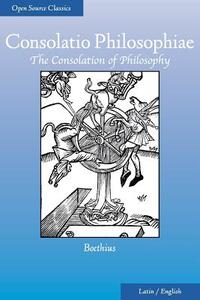You need to sign in or sign up before continuing.
Take a photo of a barcode or cover
informative
reflective
medium-paced
"Until about two hundred years ago it would, I think, have been hard to find an educated man in any European country who did not love it. To acquire a taste for it is almost to become naturalised in the Middle Ages." -- C. S. Lewis, The Discarded Image
"What name of equal distinction has suffered such wane?" -- H. R. Patch
Boethius was the "last of the Romans, first of the scholastics". Until the Sack of Constantinople when Greek priests fled west with their manuscripts, the European medievals only knew Aristotle through his writing. He influenced Dante, Aquinas, Chaucer, Milton, and Shakespeare, and for a time rivaled the Bible and St. Augustine in popularity. Until reading The Discarded Image, I'd never even heard of him.
The Consolation of Philosophy lies halfway between Plato and Dante: it's a Socratic dialogue about why bad things happen to good people, what is the ultimate good, and how to resolve God's foreknowledge with human free will, framed as a conversation between Boethius (in prison in reality and in the story) and Lady Philosophy.
C. S. Lewis argues that medieval Christians were philosophically closer to their contemporary pagans than to modern Christians. Nothing drives that point home like reading this book and knowing that scholars disagree on if Boethius was a Christian.
I was nervous reading the first fifth of the book; I didn't get it and was hoping to not have another Robinson Crusoe situation (aka I don't like a highly-regarded book). But the philosophy gradually ramps up into some heady stuff, and I did end up enjoying it.
"What name of equal distinction has suffered such wane?" -- H. R. Patch
Boethius was the "last of the Romans, first of the scholastics". Until the Sack of Constantinople when Greek priests fled west with their manuscripts, the European medievals only knew Aristotle through his writing. He influenced Dante, Aquinas, Chaucer, Milton, and Shakespeare, and for a time rivaled the Bible and St. Augustine in popularity. Until reading The Discarded Image, I'd never even heard of him.
The Consolation of Philosophy lies halfway between Plato and Dante: it's a Socratic dialogue about why bad things happen to good people, what is the ultimate good, and how to resolve God's foreknowledge with human free will, framed as a conversation between Boethius (in prison in reality and in the story) and Lady Philosophy.
C. S. Lewis argues that medieval Christians were philosophically closer to their contemporary pagans than to modern Christians. Nothing drives that point home like reading this book and knowing that scholars disagree on if Boethius was a Christian.
I was nervous reading the first fifth of the book; I didn't get it and was hoping to not have another Robinson Crusoe situation (aka I don't like a highly-regarded book). But the philosophy gradually ramps up into some heady stuff, and I did end up enjoying it.
For anyone who is human and has ever suffered, the first parts of this book contain much wisdom: do not attach your happiness to the comings and goings of the wheel of fortune, but derive it from within; from your virtues and your self-worth. For someone who is not religious, the latter parts - though interesting - strike less of a cord. However, it can deepen your understanding of Tolkiens legendarium, as he was greatly influenced by Boethius and applied its theology in his world.
One of C.S. Lewis' favorite books. I gave a copy to my father as a Christmas gift in 2007.
A classic text that I had on my shelf from undergrad. It is both an interesting philosophical text as it works, in a narrative structure, through Boehiuses concerns over good and evil but also as a historical text. The insight into the mid-first millennia was invaluable, and I enjoyed seeing the synthesis of previous philosophers given a more succinct form that would influence others for centuries.
tried to read it more charitably this time around, his arguments seem more lucid now
I've run into my first Penguin Classic that I just don't care for. Boethius is boring. His philosophy is supremely naive, and his narrative muddled. When the leading appendices tone started the book with a defense and apology of Boethius' Dark Age work, I should have taken the hint.
I've read a lot of arcane work. This is less than most of that. I don't buy quite a bit of his reasoning. When you combine that with a dubious premise, I just want to sleep. God is all things, not just the goodly, or he is no things. Boethius never gets that.
Some quotes though.
"Indeed, the condition of human nature is just this; man towers above the rest of creation so long as he recognizes his own nature, and when he forgets it, he sinks lower than the beasts. For other living things to be ignorant of themselves, is natural; but for man it is a defect."
"For bad fortune, I think, is more use to a man than good fortune. Good fortune always seems to bring happiness, but deceives you with her smiles, whereas bad fortune is always truthful because by change she shows her true fickleness. Good fortune deceives, but bad fortune enlightens."
I've read a lot of arcane work. This is less than most of that. I don't buy quite a bit of his reasoning. When you combine that with a dubious premise, I just want to sleep. God is all things, not just the goodly, or he is no things. Boethius never gets that.
Some quotes though.
"Indeed, the condition of human nature is just this; man towers above the rest of creation so long as he recognizes his own nature, and when he forgets it, he sinks lower than the beasts. For other living things to be ignorant of themselves, is natural; but for man it is a defect."
"For bad fortune, I think, is more use to a man than good fortune. Good fortune always seems to bring happiness, but deceives you with her smiles, whereas bad fortune is always truthful because by change she shows her true fickleness. Good fortune deceives, but bad fortune enlightens."
Not bad for a dude about to be tortured and killed.
The concept of it being a dialogue between the author and the faceless feminine figure of Philosophy is a cool one. Insight-wise it's not always "seminal", but a worthwhile read for anyone interested in medieval philosophers - Boethius is who you start with when reading about such people.
This book truly deserves 5 stars; in fact if I could I probably would give it an extra 6th star, and that in spite of some weird kindle formatting which I normally take stars off for (c’mon guys, how hard is it to format these things properly? I’ve done it myself and I am certainly no bankrolled publisher)
See my highlights for some examples but this book is extraordinarily well-written. It amazes me that I hadn’t engaged with this at all in my formal education.
Boethius (in my view) successfully tackles, among other things, the apparent conundrum of God’s sovereignty/foreknowledge and man’s free will and we all could have saved a lot of time in college if we’d read this before debating our own half-baked wonderings with one another. In fact I’d say this should serve as a starting point for any such discussion, since he gives it such thorough treatment.
In addition, Providence and Fortune (chance) are discussed in relation to blessing and suffering as well as where one locates true happiness in life and why the wicked prosper while the righteous suffer—considering Boethius is writing this while in prison awaiting execution for a crime he didn’t commit he has some meditations well worth listening to.
In fact the basic premise of the book is that Boethius is mourning his demise and the unfairness of the world and the apparent injustice of God against the righteous when Philosophy manifests as a woman (essentially Lady Wisdom from Proverbs) beside him and sets out to correct his errant thinking which according to her has created a far crueler prison in his mind than the one his body now inhabits. Through their discourse, Boethius (a stand-in for the reader) is slowly brought back to sound reason and firm ground.
Considering books I’ve recently read, Boethius synthesizes Aristotle with Christian thought, producing something far higher, as Boethius finds what Aristotle reaches for. It also is a far superior treatise on true happiness to Rasselas. Furthermore, Theological Retrieval for Evangelicals contains a summary of the major themes of the book which I just happened upon and found very helpful in understanding some of Boethius’ more complex points.
As a stand-in for my recommendation, C.S. Lewis cited this as one of the 10 most influential books in his life, saying “until about two hundred years ago it would, I think, have been hard to find an educated man in any European country who did not love it.”
See my highlights for some examples but this book is extraordinarily well-written. It amazes me that I hadn’t engaged with this at all in my formal education.
Boethius (in my view) successfully tackles, among other things, the apparent conundrum of God’s sovereignty/foreknowledge and man’s free will and we all could have saved a lot of time in college if we’d read this before debating our own half-baked wonderings with one another. In fact I’d say this should serve as a starting point for any such discussion, since he gives it such thorough treatment.
In addition, Providence and Fortune (chance) are discussed in relation to blessing and suffering as well as where one locates true happiness in life and why the wicked prosper while the righteous suffer—considering Boethius is writing this while in prison awaiting execution for a crime he didn’t commit he has some meditations well worth listening to.
In fact the basic premise of the book is that Boethius is mourning his demise and the unfairness of the world and the apparent injustice of God against the righteous when Philosophy manifests as a woman (essentially Lady Wisdom from Proverbs) beside him and sets out to correct his errant thinking which according to her has created a far crueler prison in his mind than the one his body now inhabits. Through their discourse, Boethius (a stand-in for the reader) is slowly brought back to sound reason and firm ground.
Considering books I’ve recently read, Boethius synthesizes Aristotle with Christian thought, producing something far higher, as Boethius finds what Aristotle reaches for. It also is a far superior treatise on true happiness to Rasselas. Furthermore, Theological Retrieval for Evangelicals contains a summary of the major themes of the book which I just happened upon and found very helpful in understanding some of Boethius’ more complex points.
As a stand-in for my recommendation, C.S. Lewis cited this as one of the 10 most influential books in his life, saying “until about two hundred years ago it would, I think, have been hard to find an educated man in any European country who did not love it.”




